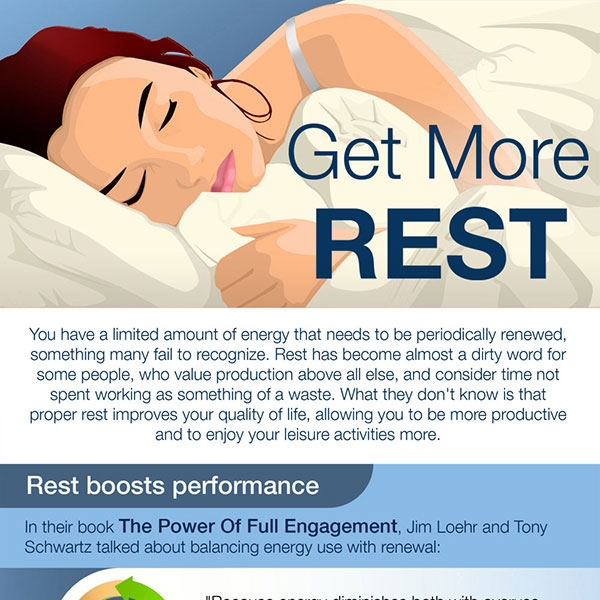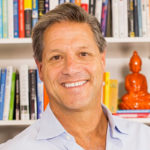Podcast: Download (Duration: 8:06 — 7.6MB)
Get Notified Of Future Episodes Apple Podcasts | Spotify | Amazon Music | Android | Blubrry | Gaana | TuneIn | Deezer | Anghami | RSS | More
In this episode:
00:46 – The value of proper rest
01:27 – Rest as an ingredient of great performance
02:28 – Greater results for less effort
02:59 – The millions who are losing sleep
03:50 – Why sleep deprivation kills
04:43 – Could you use more sleep?
05:51 – Getting better sleep
06:11 – More ways of renewing yourself
Get more tips for improving your life and your business. Click HERE
Tweetables:
Is REST a dirty word? [Click To Tweet]
Live life as a series of sprints. [Click To Tweet]
Engage fully, then fully disengage. [Click To Tweet]
Infographic:
Transcription:
James Schramko here, and today we’re talking about why you need rest.
I did an article recently called “When Does Work Ethic Become Workaholism?” In fact, there was a podcast and infographic on SuperFastBusiness.com. I encourage you to check it out. Got some great quotes from some famous business people saying how amazing you can be if you work really, really long hours, like 19 hours a day. And then I put some facts that disprove that. And today, I wanted to cover rest because I think that’s something that not too many people are getting, and it’s so significant, it deserves its own episode.
So you’ve got a limit to the amount of energy that needs to be periodically renewed. Something that many people fail to recognize. Rest has almost become a dirty word for some people who value production above all else. The same people, mind you, who are playing around with app notifications all day long. They might consider that time not spent working is something of a waste. Well I propose that your time working is great, and if you enjoy it, fantastic. But also, you’ve got to have time to live and time to renew. What some people don’t know is that proper rest improves your quality of life. It can actually extend your life. And it allows you to be more productive to enjoy your leisure activities more.
Rest boosts performance. In their book “The Power of Full Engagement,” Jim Loehr and Tony Schwartz talked about balancing energy use with renewal. They say because energy diminishes both with overuse and with underuse, we must balance energy expenditure with intermittent energy renewal. They also discussed approaching life as a series of sprints. And I like this idea. We too must learn to live our lives as a series of sprints. Fully engaging for periods of time, and then fully disengaging and seeking renewal before jumping back into the fray to face whatever challenges confront us. I think they knew what they were talking about when they wrote that.
And here’s something else to consider: Today, work rest ratios lie at the heart of periodization, a training method used by elite athletes throughout the world. Rest for them and for world-class athletes is to be alternated with intense periods of activity in order to maximize performance.
Get the most out of your effort
So here’s how you get the most out of your effort:
Tim Ferriss in “The 4-Hour Body” advocated the smallest, possible activity that would get desired results rather than time- and resource-intensive strategies that might not work. He called it the principle of the minimum effective dose or MED. Doing too much at a time can actually be harmful while taking small actions, evaluating the results then taking appropriate steps can achieve big things.
Sleep deprivation
The trend of sleep deprivation. Millions of people today are sleep deprived. And here are the numbers to show it: the US Centers for Disease Control and Prevention reported in 2012 that 30% of 40.6 million of American adults are sleeping 6 hours or less a day; 44% of night shift workers got less than 6 hours sleep compared to 28.8% of those who work during the day. About 69.7% of warehouse and transportation workers and 52.3% of healthcare and social assistance workers don’t get enough sleep. Americans who work more than 40 hours a week are also less likely to get enough sleep per night compared to those who work 40 or fewer hours.
The dangers of inadequate sleep
And here are the dangers of inadequate sleep. Previous studies have linked insufficient sleep to depression, a weak immune system and memory issues. According to WebMD, Harvard Medical researchers have also linked sleep deprivation with obesity, high blood pressure and daytime fatigue, which could lead to safety problems when working. 33% of car accidents are caused by drowsiness. And in an anonymous survey, 42% of staff at a hospital admitted to killing a patient because of sleepiness. Most Westerners are chronically sleep deprived and don’t even understand what non-sleep deprivation feels like because they haven’t experienced healthy sleep since they were a child.
Signs you need more sleep
Here are some signs that you may need more sleep. Simple decisions are difficult. Fatigue undermines your ability to distinguish between the important and the trivial, and you wind up feeling overwhelmed. You’re always hungry. Chronic sleep loss can wreak havoc on your sugar levels and reduce production of leptin, the hormone that signals when you’re full. Tired people also tend to gravitate towards sugars and simple carbohydrates. Not the healthiest food choices you can make.
You have got more colds. Inadequate sleep increases your vulnerability to infections. Volunteers exposed to the cold virus were three times more likely to get sick if they’d slept less than 7 hours a night the week prior. You cry at the drop of a hat. Sleep deprivation makes people less able to control their emotions. Tired brains also store negative memories more readily than positive or neutral ones. You’re clumsier. Research has shown that people who get less than enough sleep have slow reflexes and less precise motor functions.
Tips to improve your sleep
So here are some tips to improve your sleep: Go to bed at the same time each night, and rise at the same time each morning. Forego stimulating activities just before bedtime. Don’t eat large meals before bed. Avoid caffeine and alcohol close to bedtime. Do away with nicotine.
And here are some other forms of renewal: Aside from sleep, people need activities that restore and rejuvenate. Steven Covey in his book “The 7 Habits of Highly Effective People” listed habit 7 as Sharpen the Saw. Like many experts, he recognized that people need renewal in order to be more effective. He divides human nature into 4 aspects, all of which need to be renewed: (1) physical – that’s exercise, nutrition, stress management; (2) mental – reading, visualizing, planning and writing; (3) social/emotional – service, empathy, synergy, security; and (4) spiritual – spiritual reading, study and meditation.
I hope as a result of this episode that you can have better sleep. Get more rest and you’ll be more productive. If you liked this podcast, please share it with someone who you don’t think is getting enough sleep. If you’d like some coaching, join SuperFastBusiness.com/membership. I’ll be waiting there for you, well-rested of course, to answer your business challenges.
In this podcast and accompanying infographic, I want to give some credit to the references we’ve used: experiencelife.com, prevention.com, cdc.gov, medicaldaily.com, davidkinard.com, The Promise Of Sleep by William C. Dement, problogger.net, of course Tim Ferriss and The 4-Hour Body, Jim Loehr and Tony Schwartz for The Power of Full Engagement.
More business and life-changing resources are inside JamesSchramko membership
Liked the episode? Subscribe to the podcast on iTunes
Share your thoughts: Are you getting the rest you need?










The one I love is specifically in the IM space.
When people tell me they work 12 hours a day. It’s hard not to think, “You’re ON the computer for 12 hours a day, you’re MAYBE putting in 2 hours of a real work.”
If I catch myself drifting aimlessly into social media networks, I just get up and walk away from my computer for 20 minutes, and come back.
Even better now, I just got a new computer, and I have not loaded my passwords for things like Facebook, so even if I want to check it out, it’d be more hassle then it’s worth since I’d have to find the password.
The one I love is specifically in the IM space.
When people tell me they work 12 hours a day. It’s hard not to think, “You’re ON the computer for 12 hours a day, you’re MAYBE putting in 2 hours of a real work.”
If I catch myself drifting aimlessly into social media networks, I just get up and walk away from my computer for 20 minutes, and come back.
Even better now, I just got a new computer, and I have not loaded my passwords for things like Facebook, so even if I want to check it out, it’d be more hassle then it’s worth since I’d have to find the password.
I suspect many people have surrendered their attention and a large slice of their lives to social media
I’m passionate about the importance of sleep to your health. James you’ve raise some really good points, expecially the specification at the end of the podcast when you specify “healthly” sleep.
The surface we sleep on can have significant impact on the quality of sleep. Many people aren’t even aware that the 8 hours they spent lying there over night, they actually didn’t get any rejuvernation quality sleep at all and unfortunately, there are no health regulations related to it in Australia (and it’s highly likely the US as well), Europe probably has the best awareness for the relationship of the mattress to the quality of sleep. The only health regualation Australia has related to matresses is that it is sturdy and holds you off the ground, which is upsetting to say they least. All matresses in Australia also are sprayed with harmful chemicals before put into the retail stores ready for purchase. We are so backward in the area of keeping our sleep environement healthy, it’s ridiculous and we are a fist world country.
I’ve digressed, what I wanted to share was this video, it’s a great 3 Part video on “The Science of Sleep” by 60 Minutes on You Tube it also can be found on CBSNEWS. com http://www.cbsnews.com/videos/science-of-sleep-part-1/
In this study you will see they did a test by interupting a persons sleep more than 260 times in the 8 hours he was “asleep”. When he woke, he had said that he had woken up only 5-6 times, but the tests had shown that he was awake on each interruption, that being about 263 times. Therefore, he techically got little to no sleep at all, even though he thought he was asleep.
I’m passionate about the importance of sleep to your health. James you’ve raise some really good points, expecially the specification at the end of the podcast when you specify “healthly” sleep.
The surface we sleep on can have significant impact on the quality of sleep. Many people aren’t even aware that the 8 hours they spent lying there over night, they actually didn’t get any rejuvernation quality sleep at all and unfortunately, there are no health regulations related to it in Australia (and it’s highly likely the US as well), Europe probably has the best awareness for the relationship of the mattress to the quality of sleep. The only health regualation Australia has related to matresses is that it is sturdy and holds you off the ground, which is upsetting to say they least. All matresses in Australia also are sprayed with harmful chemicals before put into the retail stores ready for purchase. We are so backward in the area of keeping our sleep environement healthy, it’s ridiculous and we are a fist world country.
I’ve digressed, what I wanted to share was this video, it’s a great 3 Part video on “The Science of Sleep” by 60 Minutes on You Tube it also can be found on CBSNEWS. com http://www.cbsnews.com/videos/science-of-sleep-part-1/
In this study you will see they did a test by interupting a persons sleep more than 260 times in the 8 hours he was “asleep”. When he woke, he had said that he had woken up only 5-6 times, but the tests had shown that he was awake on each interruption, that being about 263 times. Therefore, he techically got little to no sleep at all, even though he thought he was asleep.